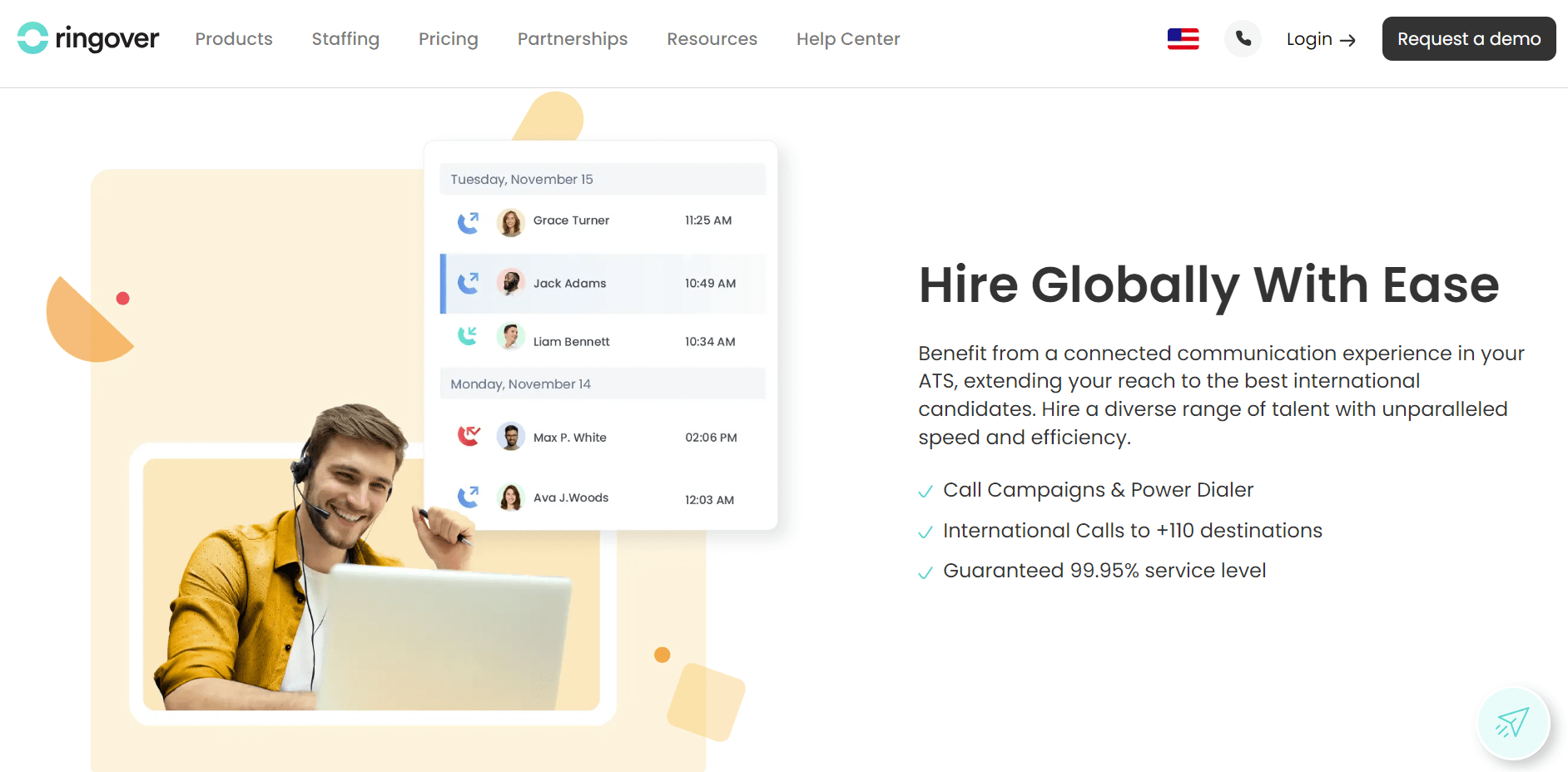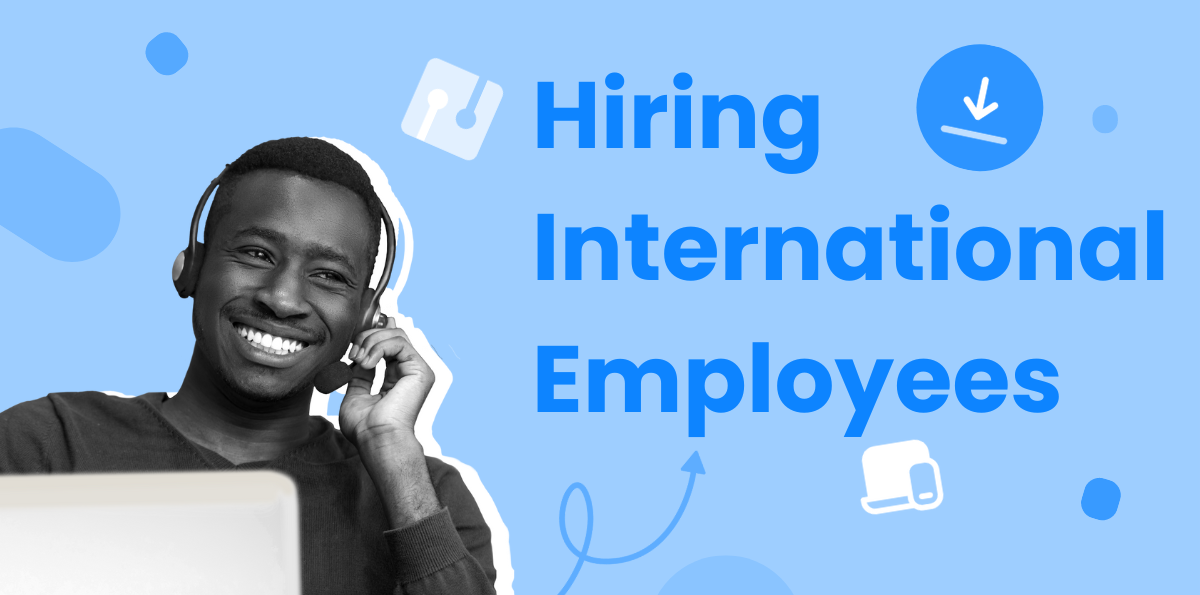Summary
This article serves as your comprehensive guide to understanding the intricacies of hiring international employees. We'll cover everything from legal and compliance requirements to uncovering the benefits and sharing best practices. Whether you're looking to hire remote workers from abroad, considering relocating them to the UK, or contemplating establishing a legal presence in a new market, our insights will help you identify the optimal approach to meet your business objectives.
Discover Ringover for RecruitmentCan I Hire International Employees?
Yes, UK companies can hire international employees, but it is crucial to adhere to the laws and regulations of the countries where you wish to employ them. The process of hiring international staff involves various government agencies, including visas, work permits, taxes, payroll, benefits, and compliance with local laws. This is particularly important if the international employee will work in their home country rather than the UK.
Depending on where the international employee resides, you may need to create a legal entity within their country or engage a third-party service provider for managing administrative tasks.
Benefits of Hiring Internationally
Hiring international employees offers a multitude of advantages for your business, enhancing both performance and innovation. Here are the key benefits of international hiring, grounded in the latest research and proven practices.
Access to a Global Talent Pool ✅
With a wider selection of candidates available, you'll be better positioned to bridge any skill gaps or shortages present in your local market. By looking beyond geographical boundaries, you can attract top talent for your roles, tapping into their distinctive competencies, experiences, and viewpoints.
Enter New Markets ✅
Employing local specialists within your target markets provides you with critical insights into the cultural nuances and preferences of your prospective customers, helping you to customise your offerings more effectively. Moreover, the networks and connections of your international employees can be invaluable in forging partnerships and relationships with key local stakeholders.
Increase Diversity and Foster Inclusion ✅
This diversity fuels creativity, innovation, and superior problem-solving by incorporating a wide range of backgrounds, cultures, and perspectives. Embracing such diversity encourages a culture of learning and collaboration, driving more innovative solutions to business challenges. In addition, committing to diversity and inclusion helps in enhancing your employer brand and overall reputation.
5 Steps to Hire an International Employee
Hiring an international employee requires a structured and lawful approach to ensure the process concludes successfully and in compliance with relevant regulations. We've distilled the process into five critical steps, drawing on a variety of best practices and insights:
1. Analyse the Possibilities
Evaluate the type of employment relationship you envision with your international hire. Whether you're considering remote employment from their home country, relocating them to the UK, or establishing a legal presence in their country, each choice presents unique implications for your business. Consider the cost, risk, and benefits of each to identify the best fit for your business objectives.
2. Define Your Roles
With your hiring strategy in place, craft precise and appealing job descriptions for the roles you aim to fill. Highlight the desired skills, qualifications, and experience, alongside the benefits and opportunities available to international hires. Clarify the work location, schedule, and role expectations, ensuring they comply with the country's local laws and regulations where the employee will be based.
3. Review the Legal Requirements
Hiring internationally necessitates adherence to the legal and tax regulations of both your and the employee's country. This step involves a thorough investigation into visas, work permits, payroll, taxes, benefits, social security, and labour contracts to ensure compliance. You might need to acquire specific certifications, licences, or engage a third-party to manage these administrative responsibilities.
4. Attain the Necessary Certifications
Depending on your chosen method of hiring, obtaining certain certifications or licence may be requisite. This might mean sponsoring visas and work permits for relocation, registering your business and engaging local professional services for setting up a legal entity, or employing an Employer of Record (EOR) for remote hires to manage the legalities of payroll, taxes, and compliance on your behalf.
5. Develop a Recruiting and Onboarding Plan
The concluding step involves the recruitment and integration of your international hire into the company. Establish a global recruitment strategy to identify the best candidates using job boards, social media, referrals, and recruitment agencies. An effective interview process is crucial for evaluating the candidates' capabilities and ensuring they align with your company's values and goals. Upon selection, present an offer that is equitable, competitive, and abides by local laws. An inclusive onboarding plan is instrumental for assimilating your new hire into the company culture, ensuring they receive the necessary training, support, and feedback to thrive in their new role. One tool that can ease these processes is a business phone system with unlimited calling to 110 destinations, such as Ringover. This VoIP phone provides powerful telephony features like video conferencing, IVR menus, and performance analytics. Not to mention, it also offers integrations with key professional staffing solutions like Bullhorn, Recruit CRM, Vincere, and CRMs like Salesforce, Hubspot, and Zoho.

4 Options for Hiring Someone from Another Country
Growing your business and tapping into a global talent pool can be significantly enhanced by hiring from other countries. Here are the four principal approaches for hiring internationally, each carrying its own set of benefits and drawbacks.
1. Sponsoring Foreign Employees and Having Them Move to Your Location
Opting for this method means you directly employ foreign workers, bringing them over to the UK. Ideal for businesses wanting close collaboration between international and local teams, it promotes a unified culture and value system. However, this option demands a significant investment in time and resources for visa sponsorship, relocation support, and adherence to local employment standards and regulations.
2. Setting Up a Legal Entity in the Foreign Country Where You Want to Hire
By establishing a subsidiary, branch, or representative office abroad, you can employ local staff under this legal framework. This strategy serves well for those seeking a tangible market presence and branding benefits, leveraging the foreign country's lower operational costs and taxation schemes. Yet, it poses challenges involving business registration, banking arrangements, and compliance with local legalities, necessitating local legal and accounting advice.
3. Working with an Employer of Record (EOR) Service
Collaborating with a third-party provider simplifies the employment process, as they become the official employer on your behalf. This model offers ease and speed, eliminating the need for legal entity establishment or visa sponsorship. International employees can be paid in their currency through preferred methods. Though convenient, this option incurs service fees and may reduce your direct control and interaction with your global team members.
4. Engaging Contractors or Freelancers
Engaging with independent contractors or freelancers for project-based work offers flexibility and cost efficiency. Financial platforms simplify this process, allowing for pay-as-you-go arrangements without the complexities of payroll, taxation, or employee benefits. While this method is straightforward, it may introduce concerns regarding work consistency, quality assurance, and the absence of long-term incentives for the workers.
Conclusion
We've comprehensively explored the ins and outs of hiring international employees. From understanding the myriad benefits and facing the potential challenges to navigating through various hiring options and steps, we've addressed crucial questions including the costs involved, sponsorship processes, and the feasibility of employing someone from a different country.
Hiring international staff offers a splendid opportunity to expand your business, tap into a global talent pool, and foster a diverse and inclusive workplace. Yet, it's no small feat—it involves a complex, detailed process requiring thorough planning and careful implementation.
Ringover can ease this process with its powerful telephony features and unlimited international and domestic calling. Curious to find out more? Start your free trial today!
Hiring International Employees FAQ
Can you employ someone from another country?
Yes, employing someone from another country is possible, but it requires adherence to both countries' regulations. Options include:
- Sponsoring foreign employees: Have them move to your location as regular employees. This option allows for close collaboration but involves significant costs and time.
- Setting up a legal entity: Establish a subsidiary or office in the employee's country. This approach offers local market advantages but carries legal and operational complexities.
- Working with an employer of record (EOR) service: Outsource hiring and administrative processes to a third party. This is quick and flexible, though potentially less personal and more costly.
- Engaging contractors or freelancers: Hire as independent contractors for more flexibility and cost-effectiveness, though with considerations around reliability and long-term commitment.
How to hire a foreign employee in the UK?
The process involves similar steps to sponsoring an international employee, with added UK-specific requirements:
- Analyse the possibilities: Determine the appropriate visa type for your foreign employee, based on your business needs and their qualifications.
- Define your roles: Create detailed job descriptions that match visa requirements and UK labour laws.
- Review the legal requirements: Comply with UK immigration and employment regulations, and obtain any necessary government certifications.
- Obtain the necessary certifications: Secure any required approvals from UK government authorities or use a service provider for assistance.
- Develop a recruiting and onboarding plan: Execute a global recruiting strategy and an effective onboarding process to welcome your foreign employee.
By following these guidelines, you can confidently hire a foreign employee in the UK, enriching your workforce with diverse talents.
How to recruit employees overseas?
Recruiting employees overseas involves several key steps and considerations to ensure a successful and compliant hiring process. Here's a guide to help companies navigate the complexities of international recruitment:
- Define the Role and Requirements: Clearly outline the job responsibilities, required skills, qualifications, and any specific language proficiency needed for the role. This helps attract the right candidates and sets clear expectations.
- Understand Local Employment Laws: Research and understand the employment laws in the country where you plan to hire. This includes regulations on contracts, working hours, minimum wage, benefits, and termination procedures. Compliance with local laws is crucial to avoid legal issues.
- Choose the Right Recruitment Channels: Utilise a mix of international job boards, local recruitment agencies, social media platforms, and professional networks to reach a broad pool of candidates. Partnering with local recruitment agencies can provide valuable insights into the local job market.
- Leverage Technology: Use video conferencing tools for interviews and virtual collaboration platforms to facilitate the recruitment process. This helps in assessing candidates' communication skills and their ability to work remotely.
- Cultural Fit and Adaptation: Consider cultural differences and how they might impact work styles and communication. Assess candidates' adaptability and openness to working in a diverse, international team.
- Legal and Compliance Checks: Ensure that all candidates have the legal right to work in the country where they will be employed. This may involve verifying visas, work permits, and conducting background checks in accordance with local laws.
- Offer and Onboarding: Once you've selected a candidate, provide a detailed offer letter that outlines all terms and conditions of employment, including salary, benefits, and any relocation assistance. Develop a comprehensive onboarding plan to help new hires integrate smoothly into your company culture and their new role.
- Set Up Payroll and Benefits: Establish a compliant payroll system to handle salary payments, tax deductions, and social security contributions in the employee's country. Consider partnering with an international payroll provider to manage these complexities.
- Consider Professional Assistance: Engaging with legal, tax, and HR professionals who specialise in international employment can help navigate the legal and regulatory requirements, ensuring a smooth recruitment process.


